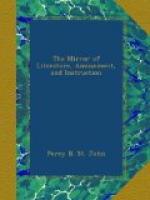HIS PORTRAIT.
Of his face, the beauty may be pronounced to have been of the highest order, as combining at once regularity of features with the most varied and interesting expression.
The same facility, indeed, of change observable in the movements of his mind was seen also in the free play of his features, as the passing thoughts within darkened or shone through them. His eyes, though of a light grey, were capable of all extremes of expression, from the most joyous hilarity to the deepest sadness—from the very sunshine of benevolence to the most concentrated scorn or rage. Of this latter passion, I had once an opportunity of seeing what fiery interpreters they could be, on my telling him, thoughtlessly enough, that a friend of mine had said to me—“Beware of Lord Byron, he will, some day or other, do something very wicked.” “Was it man or woman said so?” he exclaimed, suddenly turning round upon me with a look of such intense anger as, though it lasted not an instant, could not easily be forgot, and of which no better idea can be given than in the words of one who, speaking of Chatterton’s eyes, says that “fire rolled at the bottom of them.”
But it was in the mouth and chin that the great beauty, as well as expression of his fine countenance lay. “Many pictures have been painted of him (says a fair critic of his features) with various success; but the excessive beauty of his lips escaped every painter and sculptor. In their ceaseless play they represented every emotion, whether pale with anger, curled in disdain, smiling in triumph, or dimpled with archness and love.” It would be injustice to the reader not to borrow from the same pencil a few more touches of portraiture. “This extreme facility of expression was sometimes painful, for I have seen him look absolutely ugly—I have seen him look so hard and cold, that you must hate him, and then, in a moment, brighter than the sun, with such playful softness in his look, such affectionate eagerness kindling in his eyes, and dimpling his lips into something more sweet than a smile, that you forget the man, the Lord Byron, in the picture of beauty presented to you, and gazed with intense curiosity—I had almost said—as if to satisfy yourself, that thus looked the god of poetry, the god of the Vatican, when he conversed with the sons and daughters of man.”




